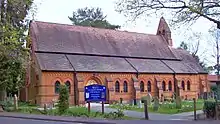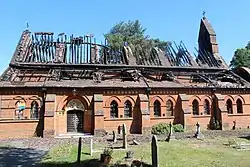All Saints Church, Fleet
All Saints' Church is the Anglican parish church of the town of Fleet in the county of Hampshire, England. It is notable for its architect, William Burges and was constructed 1861–2.
| All Saints' Church, Fleet | |
|---|---|
 View of All Saints in April 2014 | |

| |
| 51°17′02″N 0°50′34″W | |
| Location | Fleet |
| Country | England |
| Denomination | Church of England |
| Churchmanship | Broad Church |
| Website | parishoffleet.org.uk |
| History | |
| Dedication | All Saints |
| Consecrated | 29 April 1862 |
| Architecture | |
| Heritage designation | Grade II* listed |
| Architect(s) | William Burges |
| Construction cost | £3,323 |
| Administration | |
| Parish | Fleet |
| Deanery | Aldershot |
| Archdeaconry | Surrey |
| Diocese | Guildford |
| Province | Canterbury |
History and description
The church was designed by Burges and was built between 1861 and 1862.[1] It was extended to the west in 1934 by A. J. Steadman and a Lady Chapel was added in 1958 by John Purser.[1] The church was commissioned by the local squire, Charles Edward Lefroy, secretary to the Speaker of the House of Commons as a memorial to his wife, Janet Lefroy.[1] It cost £3,323.[1] It has been listed Grade II* on the National Heritage List for England since June 1987.[2]
Pevsner says of Fleet that "it has no shape, nor character nor notable buildings, except one",[1] that one being All Saints. The church is of red brick and its plan is "simple in the extreme."[3] The interior too is simply decorated but the massive sculpture, particularly of the Lefroys' tomb and of the gabled arch below which it originally sat is quintessentially Burges, "not so much muscular (gothic) as muscle-bound".[4] Janet Lefroy was originally a Walker, daughter of James Walker, who established the great marine engineering company of Walker and Burges with Alfred Burges, father of William. This family connection led to Burges obtaining the commission.[3]
The interior was significantly altered in the later twentieth century by the removal of the Lefroy tomb from its original position and by the whitewashing of the apse. Of these alterations, Pevsner comments; "And so a work by a none too prolific genius is irreparably spoiled."[4]
Fire

Far greater damage was caused in 2015 by an arson attack. On 22 June the roof and much of the interior was destroyed by a major fire.[5] Daniel Finnerty, a seventeen-year-old local, was subsequently arrested for suspected arson.[6] In November 2015, at Winchester Crown Court, Finnerty pleaded guilty to two charges of arson and was sentenced to four years in a Youth Offender Institution (reduced to 3 1⁄2 years on appeal)[7] and to a three-year extended licence.[8]
Notes
- Hampshire and the Isle of Wight; p. 234
- Historic England, "Church of All Saints, Fleet (1339861)", National Heritage List for England, retrieved 4 July 2020
- William Burges and the High Victorian Dream; p. 194
- William Burges and the High Victorian Dream; p. 195
- "Fleet All Saints Church roof destroyed by fire – BBC News". Retrieved 22 June 2015.
- "Suspected arson at All Saints Church causes major damage – Welcome to Fleet". Archived from the original on 23 June 2015. Retrieved 23 June 2015.
- R v Finnerty [2016] EWCA Crim 1513
- "CPS press release on Daniel Finnerty". Cps.gov.uk. Archived from the original on 25 June 2016. Retrieved 3 June 2016.
References
- Pevsner, Nicholas and Lloyd, David, Hampshire and the Isle of Wight, The Buildings of England, Penguin (1967)
- Mordaunt Crook, J, William Burges and the High Victorian Dream, James Murray (1981)
- "Church of All Saints, Fleet, National Heritage list for England". Historic England. Retrieved 4 July 2020.
- "All Saints, Fleet, Hampshire, by William Burges". victorianweb.org. Retrieved 12 April 2014.
External links
 Media related to All Saints Church, Fleet at Wikimedia Commons
Media related to All Saints Church, Fleet at Wikimedia Commons
